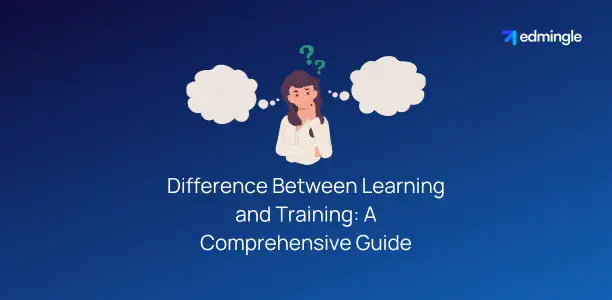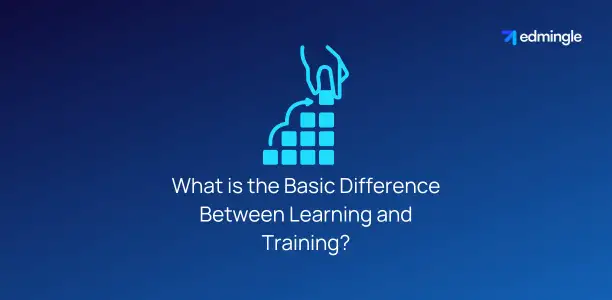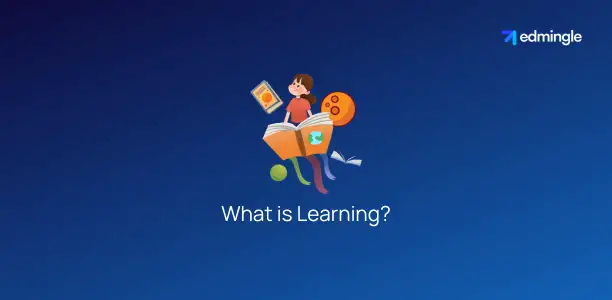
A question that often puzzles educators, trainers, and learners alike. What is the difference between learning and training?
Both these terms are frequently used interchangeably. But upon a closer look, you’ll be able to see that they hold distinct meanings.
And most importantly, implications for both; personal and professional development.
In this comprehensive guide. We’ll dive into the nuances that set the difference between learning and training.
What is the Basic Difference Between Learning and Training?

While the former is a broad & ongoing process. It encapsulates the holistic development of skills, knowledge, and understanding.
Moreover, it’s a journey of personal growth, often self-directed and intrinsically motivated.
In contrast, the latter is more structured & goal-oriented.
It is designed to equip an individual with specific skills/knowledge. These are generally required for a particular task/job or for career advancement.
Why is Knowing the Difference Between Learning and Training Important?
While it may seem like an irrelevant topic to dive deep into. Knowing the difference is crucial from many aspects.
Here are the 5 reasons why you should understand this difference:
| 1.Educational and Organizational Contexts: In educational settings, understanding the distinction helps in creating effective curricula. One that caters to holistic study, rather than just skill acquisition. In organizations, this aids in designing appropriate employee development programs. |
| 2.Personal Development: Recognizing the difference enables individuals to seek out the right opportunities. For both; their personal and professional growth. Learning focuses on broadening one’s understanding and is often self-driven. Whereas training is typically more structured and aimed at acquiring specific skills. |
| 3.Instructional Design: For educators, trainers and instructional designers, understanding these differences is far more important. As this distinction is crucial for developing effective methods and learning content. For instance. Learning strategies are often designed to encourage critical thinking and long-term knowledge retention. While strategies for the latter might focus on competency in specific tasks. |
| 4.Motivation and Engagement: Differentiating between the two can influence how individuals approach their own development. The former can often be more exploratory and driven by personal interest. On the other hand. Training programs often respond to a specific need/requirement. This can impact motivation and engagement levels. To know more about key techniques for motivating students to learn more, check our blog. |
| 5.Resource Allocation: In corporate settings, this distinction helps in efficiently allocating resources. Budgets and time can be appropriated effectively. Even more when the goals of an educational program are clear. No matter if they’re aimed at broad & specific or targeted training programs. We’re thrilled to share that with Edmingle you can reduce your operational cost by up to 20%. |
In short, understanding the difference between training and learning is key. In order to develop effective strategies, drive holistic personal development & efficiently utilize resources.
What is Learning?

It is a continuous/long-term process of acquiring knowledge, skills, values, and understanding.
And is not confined to a specific time/place. It often happens organically as individuals interact with their environment, experiences & situations.
Learning is fundamentally about the personal growth and development of an individual.
It’s focus is on enhancing their understanding and capability in a broad sense.
Characteristics of Learning
- Self-Driven and Motivated: Its often motivated by an individual’s curiosity and desire. Of knowing more or improving themselves.
- Holistic and Ongoing: It encompasses a wide range of experiences. And is not limited to a particular skill or task.
- Adaptive: Learners can apply their knowledge and skills to new situations. Applying what they’ve learned to different contexts.
- Reflective: It involves reflection on experiences. Hence, leading to deeper understanding and personal growth.
Types of Learning
- Formal: A more structured form that typically occurs in educational institutions. Like schools or universities.
- Informal: Unstructured & natural. Occurs through daily activities and interactions.
- Experiential: Hands-on learning through job experiences and practice.
- Social: Occurs through observing others. Often in social settings or communities.
What is Training?

It is a structured process. Designed to enhance specific skills or knowledge required for a particular task, job, or profession.
It is goal-oriented. And often with a clear objective in mind.
This objective can include improving performance, mastering a skill. Or acquiring a specific competency for professional purposes.
Characteristics of Training
- Goal-Oriented: The training process is focused on achieving specific objectives.
- Structured Format: It usually follows a predetermined curriculum or set of guidelines.
- Short-Term Focused: It’s often limited to a certain period. By the end of this period, the goal is immediate practical application.
- Performance-Based: Success is typically measured by the learner’s ability to perform specific tasks or apply certain skills effectively.
Types of Training
- On-the-Job: Practical training methods provided in the work environment while performing actual job tasks.
- Simulated: Use of simulations to replicate real-world scenarios is often done in high-risk industries.
- Workshops and Seminars: Structured group/team training sessions focused on specific topics or skills.
- E-Learning and Online: Utilizing digital platforms to provide quality training content and instructions remotely.
By understanding these differences and characteristics. One can better appreciate the unique roles that both learning and training play.
Key Differences Between Learning and Training (Learning vs Training)
Here, we’ll make use of a table to better understand the different aspects both these terms cater to.
| Aspect | Learning | Training |
|---|---|---|
| Definition | A continuous process of acquiring knowledge, skills, values, and understanding. | A structured process aimed at enhancing specific skills or knowledge for a particular task/job. |
| Goal | Broad personal growth and development; understanding and capability enhancement. | Achieving specific objectives, such as improving performance or mastering a particular skill. |
| Approach | Self-driven and motivated; often informal and holistic. | Goal-oriented, structured, and usually follows a set curriculum. |
| Duration | Ongoing and continuous, without a defined timeframe. | Often limited to a specific period with immediate, practical goals. |
| Focus | Broad and comprehensive, covering a wide range of topics or skills. | Specific and targeted, focusing on particular skills or tasks. |
| Application | Knowledge and skills are adaptable to various contexts. | Skills are directly related to specific tasks or job requirements. |
| Measurement | Less about assessment, more about personal growth and reflection. | Success is measured by the ability to perform specific tasks or apply skills. |
| Types | Formal, informal, experiential, social learning. | On-the-job, simulated, workshops/seminars, e-learning. |
| Outcome | Enhanced understanding, critical thinking, and adaptability. | Improved performance in specific tasks or roles. |
This table provides a clear and concise comparison of the two concepts. Hence, highlighting how they differ in various aspects.
Conclusion
As we conclude this comprehensive guide on the distinction between training and learning. We circle back to our initial query: What truly differentiates them?
Both have their unique importance in personal and professional spheres.
And understanding this helps us make informed decisions. Be it in educational settings, personal development plans, and organizational strategies.
FAQs on Difference Between Learning and Training
1.Can learning and training occur simultaneously?
Yes, they can in many scenarios. Especially in professional settings, individuals might undergo formal training for specific skills. While also engaging in a broader learning process that contributes to their overall growth and development.
2.Which is one more important – learning or training?
Neither is inherently more important. Their significance depends on the context and the individual’s/organization/business goals. A culture of learning is key for overall development and adaptability. Whereas training is crucial for acquiring specific skills and competencies.
3.What are some examples of learning and training in a workplace setting?
In a workplace, the learning culture might include activities like a mentorship program or conferences. This will contribute to overall professional growth. Training examples include attending workshops on a new software tool.
4.Can training lead to learning?
Absolutely. Training can often be a catalyst for broader learning. For example, a specific skill learned in training may spark an interest in a related field. Hence, leading to more exploratory and self-driven learning.

Leave a Reply